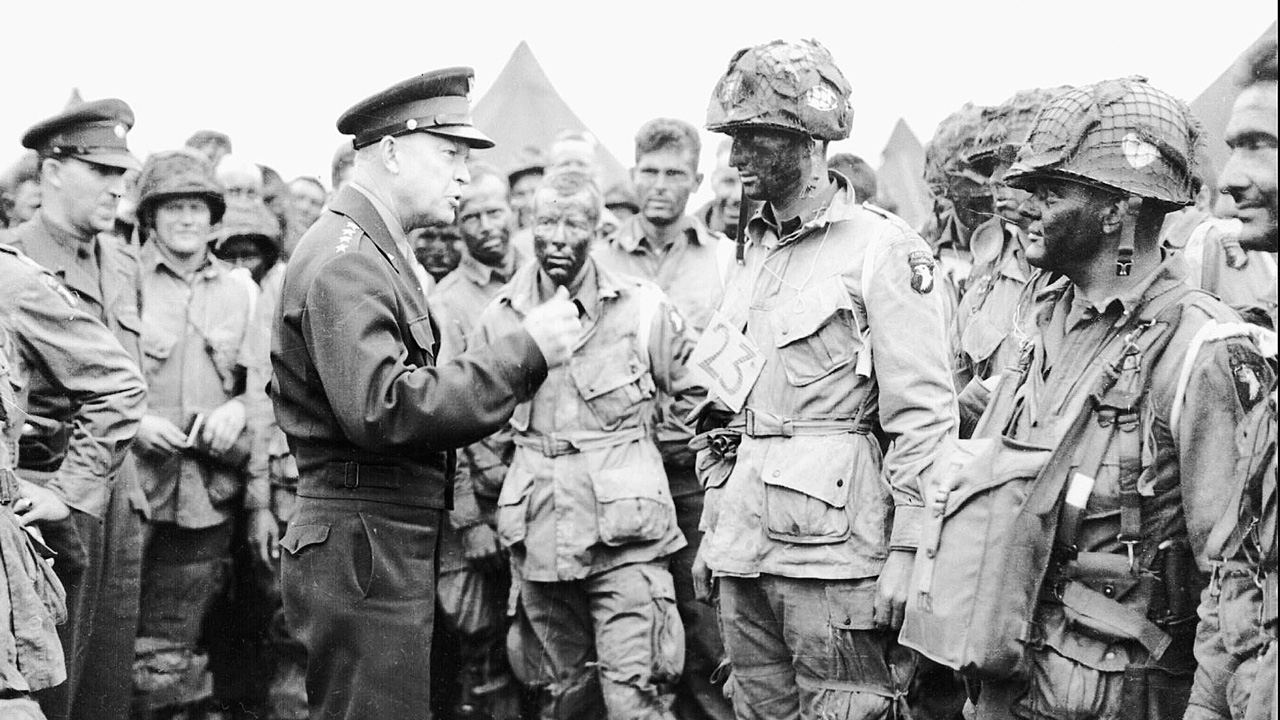
Dwight Eisenhower’s journey to Little Rock began in World War II at the Battle of the Bulge. Here, needing more troops to send to the front, Ike went against War Department policy and encouraged African-American soldiers in the Supply Service to train for combat and be treated “without regard to color or race….” Many responded. And served well. Ike took note and later told an African-American aide during the 1952 presidential campaign that he was inspired by the heroic service of black troops in World War II. “They fought nobly for their country,” he said. “And I will never forget.”
But if World War II changed Ike, it also changed America. African-Americans who went to the front of the line in battle weren’t eager to go to the back of the bus in Birmingham. The civil rights movement gained new momentum. By the time Eisenhower ran for president, a civil rights revolution was building as new claims were made for equal rights in government, business and public schools.
Eisenhower’s conservatism can perhaps best be seen in the actions he took over the course of his presidency in handling civil rights. Even though he preferred the velvet cords of persuasion to the iron bonds of law, as president he did pursue gradual change.
Eisenhower’s conservatism can perhaps best be seen in the actions he took over the course of his presidency in handling civil rights.
First, Ike desegregated the District of Columbia. Having full constitutional power over the nation’s capital, he effectively ended decades of segregation. He even pressured Hollywood executives to open up their DC theaters on a color-blind basis. They did.
Second, Ike desegregated the military. In response to Truman’s executive order in 1948, many in the military had dragged their heels. Eisenhower used his military aura to help finish the job of creating a desegregated military. Interestingly, Truman’s executive order in many ways can be traced back to Ike’s decision at the Battle of the Bulge, which proved that African-Americans were just as brave as any soldiers.
Third, Ike weighed in on Brown v. the Board of Education. He had mixed feelings about the case, worrying about the size and scope of it. But he agreed to let Attorney General Herbert Brownell file a brief on behalf of the NAACP that separate schools were unequal. When the ruling came down, he vowed to enforce it.
Fourth, Ike pushed for and signed the first major civil rights legislation since Reconstruction. His only disappointment with the new law was that Senate Majority Leader Lyndon Johnson successfully attached a “jury-trial” amendment so that whites accused of racial crimes would have the home field advantage offered by a white jury.
Fifth, he appointed fair-minded judges who would hand the civil rights movement its biggest victories for years to come. “The best civil rights judges in the South,” remembered Andrew Young, “were the Eisenhower appointees…”
Each of these steps was important. But none settled the issue. Ike had tried to move carefully, taking action where he thought he had the power and where he thought he could make a difference. He was trying to create an evolution. But he soon realized a revolution was coming.
Eisenhower had long feared that inflamed passions on civil rights might one day erupt into a “conflict of the police powers of the states and of the nation” and he feared that when that day came it might “set back the cause of progress in race relations…”
That day came in September 1957 at Little Rock.
When Arkansas Gov. Orval Faubus obstructed a court-approved desegregation plan by posting Arkansas National Guard troops in front of Central High School, the nation faced its gravest constitutional crisis since the Civil War. All of Ike’s fears about “another civil war” appeared to be coming to fruition.
He later said that sending troops into an American city was as difficult a decision as ordering the D-Day invasion.

Yet he never wavered. He allowed Faubus time and space to reconsider. He met with him in person. He urged him to do the right thing. And at last, when no other option was available, he sent elements of the 101st Airborne to Little Rock. The nine African-American children integrated the school. The crisis ended. The civil rights movement had scored one of its greatest victories ever.
Eisenhower has seldom received credit for this victory because he seldom sought credit for it. He saw the use of troops at Little Rock as a failure, not a success. He was saddened that it had come to that. He later said that sending troops into an American city was as difficult a decision as ordering the D-Day invasion.
In later years, Ike continued to think about civil rights. In a private conversation with a friend he said that Barry Goldwater’s vote against the 1964 Civil Rights Act made him “sick.” Yet Goldwater’s presidential nomination in ’64 combined with Lyndon Johnson’s support of civil rights led to most Americans associating the Democrats with civil rights.
As a result, Ike’s civil rights record has been largely forgotten even though it deserves to be remembered.
Kasey S. Pipes serves as the Norris Public Policy Fellow at the Eisenhower Institute of Gettysburg College and authored “Ike’s Final Battle: The Road to Little Rock and the Challenge of Equality.”




